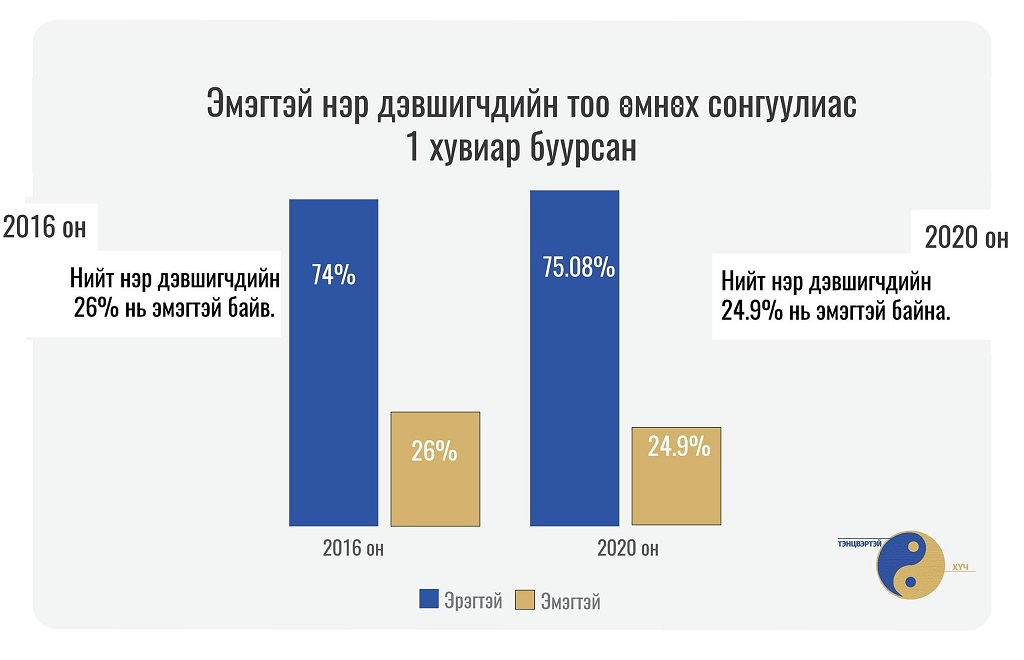
Mongolia’s parliamentary elections look set to take place on 24 June 2020. Known for its long and harsh winters, there’s no better season to hold an election in the Land of the Blue Sky—COVID-19 or not. Despite of the President calling for a postponement in the early stages of the pandemic citing cost-saving motivations, the Parliament and the General Elections Committee (GEC) ventured on. The experience of nearby Republic of Korea in conducting their mid-April elections, albeit with huge caveats, served as encouragement.
Indeed, in a recent webinar co-organized by International IDEA and the Swedish Embassy in Seoul, the Foreign Minister of the Republic of Korea, Dr Kang Kyung-wha, revealed that the government, alongside the National Election Commission, did their level best in ensuring the elections could still take place as scheduled with a high level of public trust and participation. The result, as captured by International IDEA’s recent Technical Paper entitled "Managing Elections under the COVID-19 Pandemic: The Republic of Korea’s Crucial Test", was a staggering record-high voter turnout—the highest since 1992—indicating a high level of voter trust towards the health safety measures put in place by the electoral authorities.
At the same webinar, however, Professor Lee Sook-jeong of the East Asia Institute thought an element of luck was also behind the success of the elections. At the time of elections in mid-April, the COVID-19 ‘curve’ had already flattened. Had the elections were held a month before, while the number of new infection cases was still on the rise, she is doubtful the turnout would have been so high. Simultaneously, though, Professor Lee commended the use of early voting days on 10-11 April as well as allowing voters to vote at any polling station in contributing to the success. It is important to note that these processes were already practiced in past elections and are regulated in existing laws. It would be much more difficult and complex for another country without such experience and legal bases to implement the same. Surely, this is going through the minds of election authorities around the world, including Mongolia’s GEC, who were closely watching as the Korean elections unraveled.
The Mongolian COVID-19 elections story began when on 23 March. President Battulga, who belongs to the Democratic Party, proposed postponement of the parliamentary elections citing the need to save costs and use the funds to fight the pandemic instead. This led to much debate inside and outside parliament as cost saving cannot be considered a constitutional reason to postpone an election. Eventually, on 13 April, the majority faction in the bipartisan parliament, the Mongolian People’s Party, decided that elections should proceed as scheduled. The decision was perhaps made based on the consistently low number of COVID-19 cases in the country and relatively flat curve according to Worldometer. This gave the GEC the green light to go full speed into their preparations for unprecedented COVID-19 elections.
Sure enough, two weeks later, the GEC announced a set of recommended safety measures to election contestants during the candidate registration and nomination period. Similar to the preventive measures International IDEA suggested in its "Elections and COVID-19" Technical Paper, the recommendations include washing hands, keeping a safe distance of at least 1.5 meters, spraying materials and equipment with disinfectants as well as wearing masks all the time.
A more profound regulation—Resolution #188, 2020 of the Government of Mongolia—came on 27 May, almost exactly a month prior to election day. It governs COVID-19 outbreak prevention measures during the 2020 parliamentary elections specifically. The Regulation aims at “preventing and controlling COVID-19 outbreak” during the conduct of the elections. It is relevant for campaigning and voting processes.
On campaigning, the Regulation seems to favour meetings to be conducted online, but there are many in Mongolia, especially in the countryside, that have insufficient access to the Internet. Therefore, if online meetings were not possible, the Regulation went on to rule that safe distance, body temperature checks, strict ventilation regime, sanitization of the vicinity and the wearing of masks by all shall be ensured by the campaign organizers. Candidates and campaign workers must also wear vinyl gloves when handing out materials. All masks and gloves used must be discarded in a designated sealed container. The Regulation puts the responsibility of fulfilling these requirements upon the election contestants (parties/coalitions and candidates). However, mechanisms and resources need to be put in place to ensure they are met. According to a colleague, without additional resources, it would be difficult for the GEC to enforce this Regulation, especially given “offline” election campaigns are widespread in this vast country. Mongolia does not have a dedicated, well-funded election supervisory body like the Bawaslu in Indonesia. It also does not have a large network of official election observers that countries like India and Bhutan have.

must touch this same device with their bare fingers posing it as a potential virus transmitter if not cleaned before each use.
(Photo: Taken from a YouTube video made by Youth Policy Watch NGO Mongolia featuring GEC staff explaining the process of voting)
During voting, the onus is more on the GEC to enforce the Regulation’s implementation. Quite understandably so, considering all polling stations would have election officials present by default. Polling stations are to be cleaned and disinfected prior to voting day. Gatherings inside and outside the polling station shall be avoided. Similar to the Korean elections, voters shall be temperature checked, wear face masks and wash their hands with hand sanitizer as they enter the polling station. As in Mongolia’s case voters are identified by means of a fingerprint check, voters will have to sanitize their hands twice: first as they enter and second after they have had their fingerprints checked. One can imagine, the fingerprint scanners can be a formidable vehicle for viral transmission if one is not careful. Furthermore, the polling station shall be ventilated (room emptied with doors and windows open) every half an hour for at least 10 minutes. High contact surfaces must be disinfected every two hours, thus between 07.00 and 22.00 voting period, the polling station must be disinfected at least seven times.
All these measures are new and the GEC has the uphill battle to get the information out to political parties/coalitions, candidates and voters in about a month. While much information is made available on its website, a colleague observed that not much have been distributed by the GEC through mainstream and social media. At the aforementioned webinar, Foreign Minister Kang noted that the regular press conferences conducted by the National Election Commission of Korea were instrumental in gaining voters trust to participate in the elections. Let us hope the GEC follows this example.
With or without COVID-19 amongst us, the level of women’s participation in politics remains a challenge. Gender equality in politics is still far from being true. For these upcoming Mongolian elections, the number of women candidates has not increased. International IDEA’s Political Finance Handbook and country research done by others in Colombia, Kenya and Tunisia have shown that the increase in the cost of political campaigns has exacerbated this inequality. The recently concluded European Union-funded “Level-up: Political Finance with Integrity” project in partnership with the Open Society Forum tried to address this. While progress has been made, surely this effort is a marathon, not a sprint. International IDEA along with others that subscribe to the same mission need to keep working tirelessly for enhancing women’s participation and representation in politics.

(Source: National Committee for Gender Equality of Mongolia)
Mongolia is among some thirty countries that have decided not to postpone their elections while more than 60 countries opted for postponement. There are good reasons to postpone and there are equally good reasons to go ahead. All reasons are contextual and dependent upon the state of COVID-19 in the respective countries. What may be good for one country, may not be so for another. The experiences of other countries are nevertheless useful insights for any country. International IDEA’s raison d’etre is among others to assist countries in doing so. Henceforth, governments of countries due to run elections during the COVID-19 pandemic had better carefully consider, in consultation with their citizens, what would be best for their country and importantly, for the safety of their citizens’ health.




